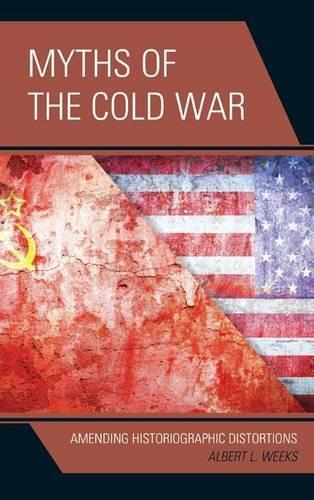
Myths of the Cold War: Amending Historiographic Distortions
(Hardback)
Publishing Details
Myths of the Cold War: Amending Historiographic Distortions
By (Author) Albert L. Weeks
Bloomsbury Publishing PLC
Lexington Books
2nd July 2014
United States
Classifications
Professional and Scholarly
Non Fiction
European history
Modern warfare
909.825072
Physical Properties
Hardback
154
Width 161mm, Height 236mm, Spine 17mm
372g
Description
Myths of the Cold War: Amending Historiographic Distortions provides a corrective for the distortions and omissions of many previous domestic and foreign (including Russian) studies of the Cold War, especially those published since 2000. The present interest motivation in Weeks's analysis is gaining a clear understanding of the bi-polar, $4 trillion, nuclear-war-threatening standoff that lasted over 40 years after World War II until the demise of the Soviet Union in 1991. Without such knowledge and understanding of this dangerous conflict, any future encounter of the cold-war type with another nation-state is liable to be construed in confusing ways just as the U.S.-Soviet Cold War was. The consequence of such misunderstanding in the historiographic sense as well as in policy-making at the highest level is that the populations of the contending powers will have distorted conceptions of the reasons for the confrontation. The result of this, in turn, is skewed tendentiousness that masks concrete, underlying causes of intense inter-state contention. Practical benefits thus flow from an unprejudiced analysis of the past Cold War with Communist Russia. This understanding can help prevent a future conflict, such as one with Communist China, which some reputed sinologists are currently predicting, as well as one with post-Soviet Russia. Conversely, if a new cold war is imposed on the West, a clearer understanding of the post-World War II archetypical Cold War will be edifying.
Reviews
Albert Weeks . . . has produced a concise and polemical book. Myths of the Cold War: Amending Historiographic Distortions pulls you up short with its meticulous survey of how Russia spooked the West into reacting in unusually bellicose terms. . . .Should another cold war emerge, this book will serve as a useful backgrounder. * The American Spectator *
Albert L. Weeks's formidable juxtaposition of arguments from Cold War participants and historians contributes much to our understanding of the still rampant controversies, such as the Russian invasion of the Ukraine. Especially valuable are his many translations from Soviet and post-Soviet era documents, supplied in context. These documents have been largely unavailable to those who do not read Russian. This book is an invaluable research compendium for readers, scholars, lay historians, and students alike. -- Richard Raack, California State University, East Bay, author of "Stalin's Drive to the West: 1938-1945, The Origins of the Cold War"
Author Bio
Albert L. Weeks served in the U.S. Department of State as senior Soviet analyst during the Cold War and is the author of several books on international affairs.
